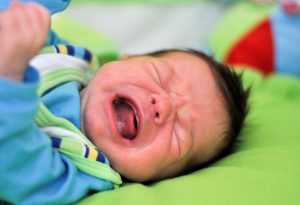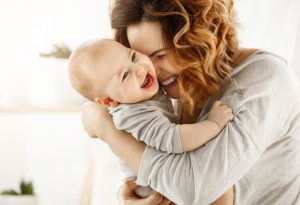The moment we see a little baby wrapped up all cosy and cuddly, we are instantly overwhelmed and filled with affection. We cannot help but kiss and snuggle with the newborn baby. We all are familiar with the feeling and have been doing so since ages. Although we do it purely out of love, it has been found that we may be unintentionally harming the baby by doing so. It has been found that kissing a baby on the lips or closer to the mouth can result in the spread of certain conditions, some harmless and some definitely dangerous for a newborn. However, it’s not just kissing the baby on or near the lips that could pose a problem. Kissing the baby on his hands or other parts of the body, which will then come in contact with his mouth, is equally troublesome.
Risks of Kissing a Newborn
Affection is essential for the proper growth and development of the baby. Parents kissing their baby is normal, but at the same time, it is essential that the parent safeguards the baby from contracting hazardous infections. One of the key points you should consider is not letting anyone kiss your baby on or near the mouth, specifically during the initial three months of birth. The following are a few conditions that could be triggered in your baby when kissed by someone who is infected or wears/eats something that the baby is allergic to.
1. Cold Sores
Also known as fever blisters or oral herpes, your baby can be afflicted with this condition when kissed by an adult who has a cold sore. It is caused by the herpes simplex virus type 1 (HSV 1) and starts off as a small blister around the lips or mouth. However, it can spread to other parts of the face as well, such as the nose, cheeks, and chin. The issue also remains that once the virus enters the body, it stays for life. While some children may never have a cold sore ever again, others may suffer multiple outbreaks of the same in the future. Therefore, kissing the baby (even on other parts of their body, like their hands) should be completely avoided if the person doing so has a cold sore.
2. Respiratory Illness Due to Exposure to RSV (Respiratory Syncytial Virus)
RSV leads to a condition where a baby’s lungs get infected, making breathing difficult for the baby. Besides, it’s highly contagious, making it quite difficult to prevent young kids from getting infected. If the infected child or adult approaches and kisses your baby, the virus will pass on to the baby. In babies, the air tubes for breathing are of a tiny size and very thin, so inflammation caused by infection can prove dangerous; more so in the case of premature babies who already have a much weaker immune system than their peers born at term.
3. Food Allergies
Many kids and adults face allergies resulting from some or the other food. People may be unaware of gluten present in their lipstick, which may be harmful for a child who is having celiac disease. It is best to discourage people from kissing on or near the baby’s lips because you can never be sure of what food the person might have consumed, pieces of which could still be lingering in their mouth.
4. Heightened Risk of Cancer Due to Exposure to Toxic Chemicals
Skincare products are known to contain chemicals that help men and women look young and fresh. Such products may contain parabens, formaldehyde, artificial colours, and much more. These are considered to be endocrine interrupters and have even been found to be associated with risks of cancer. Hence, it is advisable that people who use such products avoid kissing your baby. This way, you can safeguard your baby from getting exposed to cosmetics containing such toxic chemicals.
5. ‘Kissing Disease’
‘Kissing Disease’ is a nickname given to the term ‘mononucleosis’, an infection which is passed through saliva, often through kissing. Although it is known to occur more commonly among teenagers and adults, it can affect infants too. In infants and children, the condition results in a runny nose or cranky behaviour and may also lead to respiratory problems in rare cases. It is a viral disease and does not have any treatment. The child has to bear with the illness until his immune system helps get rid of the infection on its own. It’s contagious and can pass on to other kids and adults very easily.

6. Cavities
We all are aware of the fact that not maintaining oral hygiene can lead to cavities in the teeth. A lesser-known fact is that the kisses showered on a baby may also lead to cavities in the child’s teeth. The bacteria called streptococcus mutans present in one’s saliva, which, when passed on to the child, can lead to cavities in his tiny teeth. Someone may unintentionally pass on the germs to your child through a kiss or while sharing food with the baby. To be on the safer side, you (or anyone feeding the baby) should ensure that you don’t spray saliva while blowing on food to make it cool enough for him to eat.
7. Weakened Immune System
Babies are most vulnerable to illnesses during their initial few months when their gut bacteria are still in the developmental stage. For this reason, any kid or adult who wishes to come in contact with your baby has to ensure that they have washed their hands well and do not have any signs of illness. There may be cases where an adult or child, unaware of their illness, comes and kisses the baby. In such cases, the baby gets exposed to germs and has to fight it with weak immunity.
Also, babies start getting vaccinations starting from birth up until a certain age and require several doses to make the vaccine effective in their body. Hence for the initial few months, their body has negligible immunity and is highly sensitive to germs. You should be strictly watching over your child and ensure his safety from any diseases.
8. Hand, Foot and Mouth Disease
Hand, foot and mouth disease usually occurs in children at some point in their childhood and is marked by sores which pop up all over the child’s body and mouth. It can be spread through actions of close contact, which includes kissing. Children feel tired, have a sore throat and get cranky in such conditions. They even suffer from fever. You should ensure that any infected adult or child does not come in close contact with your baby or kiss him even on his little hands.
Precautions to Take While Kissing Your Baby
Each part of the human body is inhabited by bacteria and viruses, which are mostly harmless to healthy adults, but can affect newborns. This is because the immune system of newborn babies is not as well developed or strong as compared to that of adults. Therefore, it is highly recommended that you take the below precautions while cuddling or kissing your baby, and urge others to do the same as well.
- Be regular in maintaining your personal and oral hygiene.
- Maintain the oral hygiene of the baby as he will be salivating a lot.
- Remember to wash your hands before you attend to your baby.
- Regularly bathe your baby.
- Use baby wipes to clean your baby’s mouth and face to keep him fresh.
- Educate your friends, family and relatives on these precautions as well, for the safety of the baby.
- Place baby utensils and hygiene products separate from the belongings of others in the house.
- Many unexpected places and things in the house could be loaded with germs. It is best to avoid direct contact with the baby immediately after touching the TV remote, dish towels, mobile phones, and handbags.
- People having any sort of infection or the potential to contract infections should stay away from the baby.
- People who have an ongoing respiratory condition like a common cold, influenza or an undiagnosed chronic cough, chicken pox or intestinal illness, should avoid kissing the baby.

The risks are of kissing infants are serious and kissing your baby on the lips makes things worse. However, this does not mean that kissing your baby is not an option. Keeping the precautions listed above in mind, you are at full liberty to snuggle with your baby to your heart’s content!









